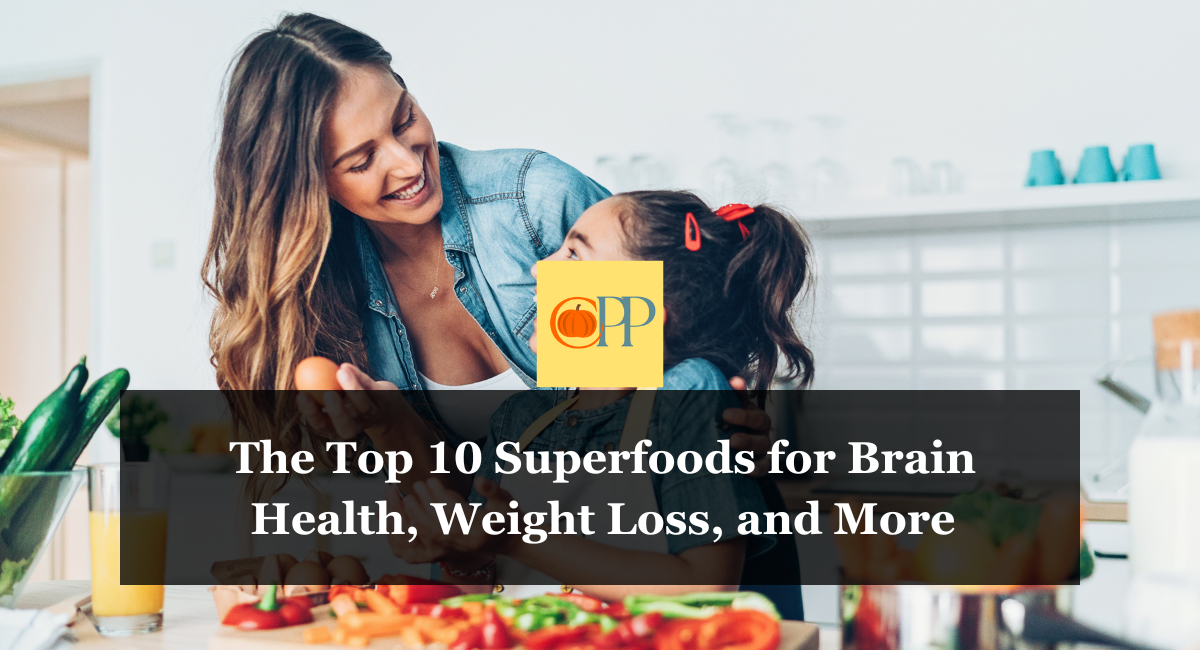Incorporating superfoods into your diet can significantly enhance your overall health, providing essential nutrients that promote brain function, aid in weight loss, and contribute to various other health benefits.
Here’s a detailed look at the top 10 superfoods and their advantages, along with potential drawbacks to consider.
1. Blueberries
Benefits:
- Brain Health: Blueberries are rich in antioxidants, particularly flavonoids, which have been shown to improve memory and cognitive function.
- Weight Loss: They are low in calories and high in fiber, promoting fullness and aiding in weight management.
- Other Benefits: Blueberries also support heart health and reduce oxidative stress.
Potential Drawbacks:
- Digestive Issues: Overconsumption may lead to digestive problems in some individuals.
2. Salmon
Benefits:
- Brain Health: Salmon is high in omega-3 fatty acids, crucial for brain function and reducing inflammation.
- Weight Loss: It is rich in protein, which helps increase satiety and boost metabolism.
- Other Benefits: Salmon supports heart health and provides essential vitamins like B12 and D.
Potential Drawbacks:
- Mercury Content: Some salmon may contain trace amounts of mercury, so it’s important to consume it in moderation.
3. Avocados
Benefits:
- Brain Health: Avocados contain monounsaturated fats, which support healthy blood flow and brain function.
- Weight Loss: They are high in fiber and healthy fats, which can help you feel full longer.
- Other Benefits: Avocados provide vitamins E, K, and potassium, and support heart health.
Potential Drawbacks:
- Caloric Density: Avocados are calorie-dense, so portion control is important to avoid excessive calorie intake.
4. Dark Chocolate
Benefits:
- Brain Health: Dark chocolate is rich in flavonoids, which can enhance cognitive function and improve mood.
- Weight Loss: In moderation, it can satisfy sweet cravings with less sugar than milk chocolate.
- Other Benefits: Dark chocolate contains antioxidants that support heart health.
Potential Drawbacks:
- Caloric and Sugar Content: Overconsumption can lead to weight gain and blood sugar spikes.
5. Walnuts
Benefits:
- Brain Health: Walnuts are high in DHA, a type of omega-3 fatty acid that supports brain health and cognitive function.
- Weight Loss: They are high in protein and fiber, promoting satiety and reducing overall calorie intake.
- Other Benefits: Walnuts support heart health and reduce inflammation.
Potential Drawbacks:
- Caloric Density: Like other nuts, walnuts are high in calories, so moderation is key.
6. Spinach
Benefits:
- Brain Health: Spinach is rich in antioxidants, vitamins, and minerals that support brain function and delay cognitive decline.
- Weight Loss: Low in calories and high in fiber, spinach can help you feel full and satisfied.
- Other Benefits: Spinach supports eye health and reduces oxidative stress.
Potential Drawbacks:
- Oxalate Content: High oxalate levels in spinach can contribute to kidney stone formation in susceptible individuals.
7. Greek Yogurt
Benefits:
- Brain Health: Greek yogurt contains probiotics that support gut health, which is linked to brain function.
- Weight Loss: High in protein, it helps increase satiety and supports muscle maintenance.
- Other Benefits: Greek yogurt is a good source of calcium and vitamin B12.
Potential Drawbacks:
- Lactose Intolerance: Some individuals may experience digestive issues due to lactose content.
8. Quinoa
Benefits:
- Brain Health: Quinoa is rich in iron, which supports oxygen flow to the brain, enhancing cognitive function.
- Weight Loss: High in protein and fiber, quinoa can help you feel full and reduce overall calorie intake.
- Other Benefits: Quinoa is a complete protein source, providing all essential amino acids.
Potential Drawbacks:
- Digestive Issues: Overconsumption may cause digestive discomfort in some people.
9. Turmeric
Benefits:
- Brain Health: Curcumin, the active compound in turmeric, has anti-inflammatory and antioxidant properties that support brain health.
- Weight Loss: Turmeric may help boost metabolism and reduce inflammation associated with obesity.
- Other Benefits: Turmeric supports joint health and reduces the risk of chronic diseases.
Potential Drawbacks:
- Absorption Issues: Curcumin is poorly absorbed on its own, so it should be consumed with black pepper to enhance absorption.
10. Green Tea
Benefits:
- Brain Health: Green tea contains caffeine and L-theanine, which improve brain function and promote relaxation.
- Weight Loss: It can boost metabolism and increase fat burning, aiding in weight loss.
- Other Benefits: Green tea is rich in antioxidants that support overall health and reduce the risk of chronic diseases.
Potential Drawbacks:
- Caffeine Sensitivity: Excessive consumption can lead to caffeine-related side effects like insomnia and anxiety.
Conclusion
Incorporating these superfoods into your diet can provide numerous health benefits, from boosting brain function to aiding in weight loss and supporting overall well-being.
However, it’s essential to consume them in moderation and be mindful of any potential drawbacks. By balancing these nutrient-dense foods with a healthy lifestyle, you can optimize your health and achieve your wellness goals.
-
The Top 10 Superfoods for Brain Health, Weight Loss, and More

Incorporating superfoods into your diet can significantly enhance your overall health, providing essential nutrients that promote brain function, aid in weight loss, and contribute to various other health benefits. Here’s … Read more
-
Coke Zero vs. Diet Coke

For decades, Coca-Cola has offered two sugar-free cola options: Diet Coke and Coke Zero. Both beverages boast zero calories and zero sugar, leaving many consumers wondering – what’s the real … Read more
-
A New Study Says Gray Hair May Be Reversible

Hair color comes from melanin, a pigment produced by melanocyte stem cells located at the base of hair follicles. These melanocyte stem cells go through different stages, and at each … Read more